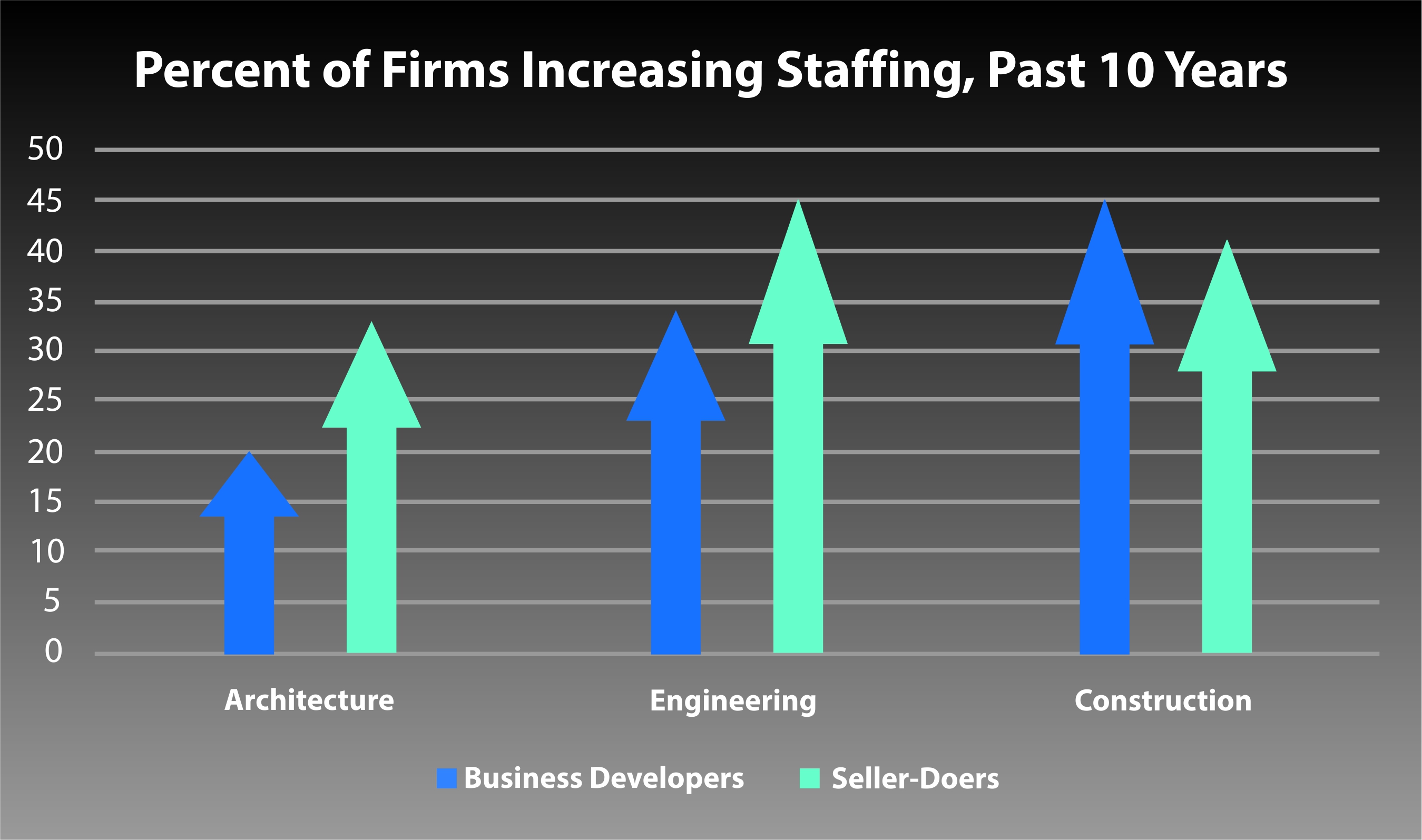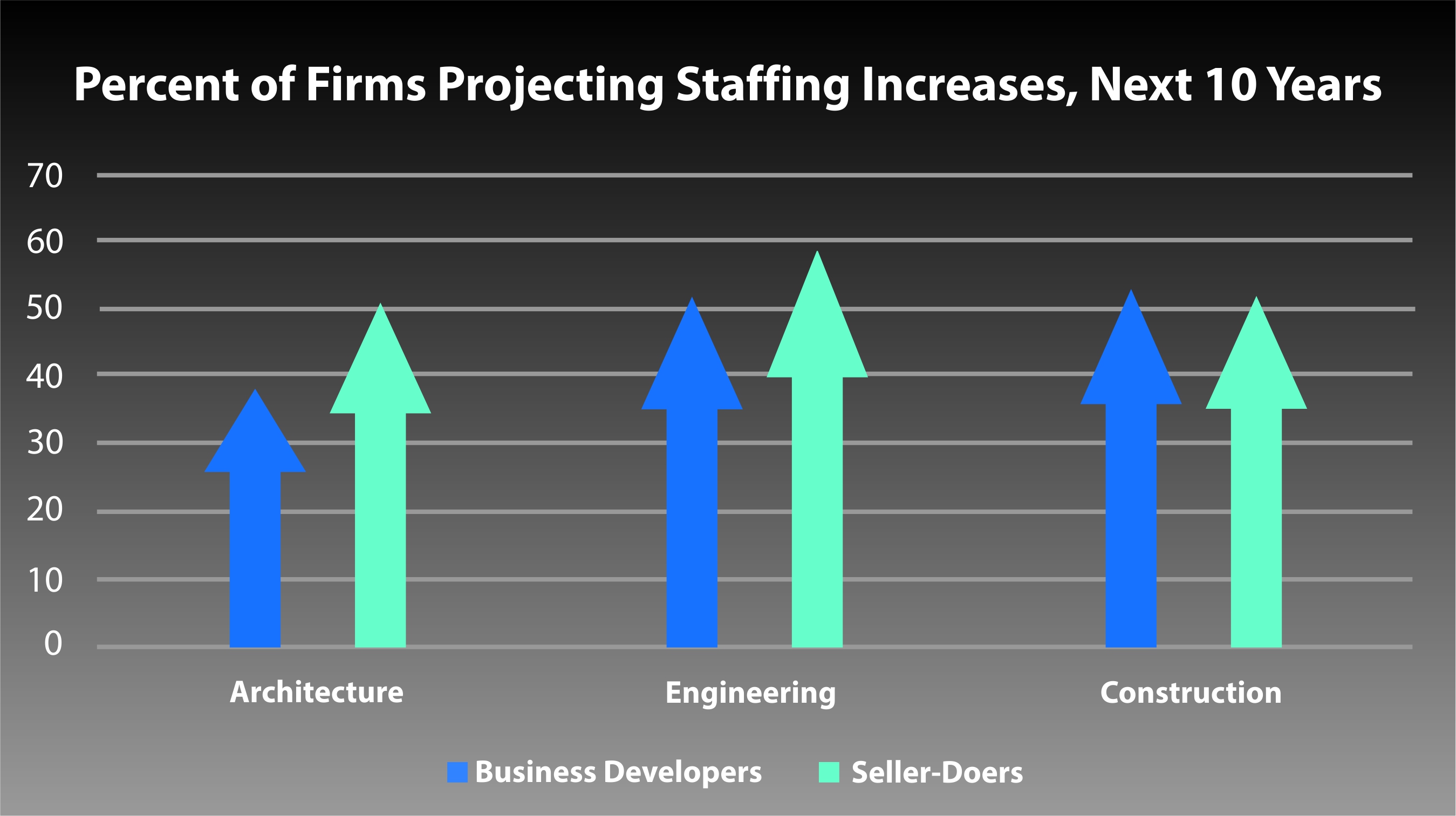Ever since the release of the Society for Marketing Professional Services / SMPS Foundation report,Sell. Do. Win Business. How A/E/C Firms are Using Staff to Win More Work(PDF),我与高级销售和营销主管以及公司负责人进行了许多非常有趣的对话。
这项研究(包括近1400次调查和数十个电话访谈)加强了一些假设,并对与建筑实践,工程实践和建筑行业业务营销和业务发展有关的其他人提供了明确的清晰度。
如果从研究中收集到一个主体的主题,那就是A/E/C公司在业务发展上花费的钱比过去更多的钱(BD) - 他们打算将来增加支出。该结论不是基于任何具体费用的预测(例如,在BD上花费的净收入的百分比),而是卖方选择和专门的业务开发人员职位在建筑,工程,建筑和相关公司的显着增长。
Compared with ten years ago, architectural firms have increased the number of business developers they employ by 20%, engineers by 34%, and construction firms by 45%. A decade ago we were enjoying the pre-recession boom in the A/E/C industry, so the growth in dedicated BD professionals is significant.

For the number of seller-doers compared with ten years ago, the statistics are equally impressive. Thirty-three percent of architects have increased the number of seller-doers on staff, while 43% have increased the amount of time that their seller-doers spend doing business development. For engineers, the numbers are greater: 45% of firms have added seller-doers while 45% have increased the percent of time that seller-doers focus on the sales portion of the equation. And for contractors, 41% have added seller-doers while 49% report that their seller-doers spend more time on business development than they did a decade ago.
对于公司高管来说,这意味着一件事:更多开销。
So what gives? Why are firms willing to increase their labor expenses for business development? There are numerous factors driving this trend, but the reality is that we are in a highly-competitive marketplace. Client loyalties have changed: whereas a decade ago there was so much construction happening that a lot of firms could “sit back and wait for the phone to ring” (it’s never really that easy, is it?), that isn’t the case anymore. We’re in a new era of purchasing, with the dreaded “three-bid mentality” destroying long-term relationships and potentially negatively impacting the owners/clients – when the A/E/C firm that knows their culture, facilities, and/or structures isn’t the low bid and newbies come in, this could be a good thing. Or a very bad one!
Third-party facilities managers are increasingly common, as are prequalification/screening firms. So a client you’ve worked with for twenty years may suddenly outsource A/E/C hiring decisions to a firm that doesn’t know you, or require you to go through a screening process (often online) to see if you meet their “new” criteria. Contract language is changing as well, with the dreaded “duty to defend” clause appearing in an alarming number of contracts, forcing firms to walk away from existing clients because the contract terms have become unacceptable – or even uninsurable.
除此之外,婴儿潮一代的客户还在伙计中退休,与他们同意某些建筑,工程,环境,咨询或建筑公司的忠诚,其替代者通常没有忠诚度,迫使您以长期的方式“从头开始”术语客户端。
Furthermore, depending upon your geographic area and the markets you serve, there may very well be a lack of work to go around. Some areas and markets are booming; others not so much.
因此,由于这些原因和其他原因,A/E/C公司在业务发展方面需要更多的“脚”。他们需要搜索更广泛,更深入的寻找新客户,甚至可以与过去或当前客户获得重复的佣金。
But this isn’t permanent, is it? Certainly, the tide will change. Right?
Well, according the SMPS/SMPS Foundation research, firms believe we are in a new norm – one that may become even more extreme over the next decade.
Survey participants were asked about anticipated staffing changes in the coming decade. Fifty-one percent of architectural firms anticipate adding even more seller-doers while 38% expect to hire more business developers. Engineers are projecting significant expansion of these positions as well, with 59% of firms planning to add seller-doers and 52% expecting to add dedicated business developers. The numbers were similar for construction firms, with 52% anticipating adding seller-doers and 53% adding business developers over the coming decade.

That’s huge. And again, that translates to major increases in overhead, above and beyond the increases that firms are seeing today.
那么这笔钱将来自哪里?利润?削减其他类别的费用(包括非劳动营销费用)?钱必须来自某个地方,但是公司期望一个简单的公式可以发挥作用:
More business developers + more seller-doers = more contracts.
Simply put, in order to grow, they have to expand the ranks of people involved with sales. And they hope – expect – that “a rising tide will lift all boats,” so that ultimately they aren’t spending more for business development labor as a percentage of revenue, otherwise it comes directly off the bottom line.
But are A/E/C companies approaching business development wisely? Do they have the right stuff, baby?
尽管公司希望拥有一个千篇一律的全能,即开箱即用的BD人员配备方式,但现实是,每个公司都需要开发最适合他们的公式及其独特的环境。
This begins with a thorough understanding of your target markets. The majority of successful firms are focused on a few primary markets. Yes, there are still generalists, but they increasingly struggle when competing against niche firms, often being unable to pass the “sniff test” when it comes to baseline qualifications.
所以好好努力看看你pursu的市场e. Where do your firm credentials exist? How about staff credentials, which are often of equal or greater importance to firm experience? Are these markets profitable? Just because you do a lot of K-12 education work doesn’t mean you should, particularly if you keep losing money on projects!
When you truly understand your firm’s areas of focus, you next need to match your business development approach to those markets. Alignment is critical here, or you’ll struggle to maximize the value of your BD staff.
一些市场对于卖方做法很有意义。客户非常复杂,并期望第一次会议的详细,技术驱动的对话。如果不将销售人员与客户的期望保持一致可能是死亡之吻:您不会被邀请回来第二次会议。这样的市场的一个例子将是工业或医疗保健。
“即使您正在开发的路线图似乎都需要所有卖家,也需要
don't discount the role of the dedicated business developer."
其他markets, however, do not require such technical conversations early on. The gatekeepers, and even decision-makers, may not be technical in nature, and a non-technical business developer may offer perfect alignment for the client needs, excelling at the front-end “getting to know you” conversations. Local governments, for instance, often fall into this bucket.
Maybe all of your target markets favor the seller-doer approach, maybe they all favor the dedicated business developer. Most likely, there is a need for both. If you are a small firm, having a dedicated business developer may not be an option; yes, there are some very small firms that have fulltime sellers, but that is not the norm.
即使您正在开发的路线图似乎都需要所有卖家,也不要折磨专门的业务开发人员的角色。最近的SMPS研究发现,销售专业人员的作用正在改变,不断发展。他们仍在积极开展业务发展,但越来越多的人在教练卖家,培训他们成为有效的卖家。他们正在研究战略计划并使销售计划保持一致。而且它们通常是准客户遇到的第一个声音或面对面的声音,为卖方做的开门打开了大门。我经常听到它说业务开发商是开瓶器 - 他们向潜在客户打开大门,而卖方选择者很接近 - 他们正在结束交易,着陆合同。
由于这两个角色都是如此关键,因此公司正在增加,并将继续增加两个职位。
But only you can determine what makes the most sense for your markets, your services, and your geographic regions. One size only fits one size, so don’t try to force square pegs into round holes – you may lose clients, project opportunities, and talented staff along the way.
对于许多公司而言,失去才华横溢的员工令人恐惧的主张与不降落新项目委员会一样。高效的卖方销售者很少见,当公司失去一家人时,当该人离开时,他们可能会失去很多业务。同样,虽然SMP/SMPS基金会调查中只有8%的参与者报告说他们找不到合格的业务开发人员,但在未来几年中,这个数字肯定会增加。造雨者正在退休,经验丰富的业务开发商 - 在专业初期进入A/E/C行业(直到1970年代后期,这是违法的,对于专业服务公司而言,销售或出售的是不道德的)。另外,对BD专业人员和卖方选择的需求正在增长,因此未来找到这些职位将变得更加困难。
So what’s the takeaway? Look at your markets and your BD approaches to ensure that you are aligning the sales function with the client/prospect needs. Evaluate your staffing and identify the gaps. And develop a plan to ensure that you are not only effectively responding to the market today, but will be in the coming years.
只有这样,您才能拥有“正确的东西”!

